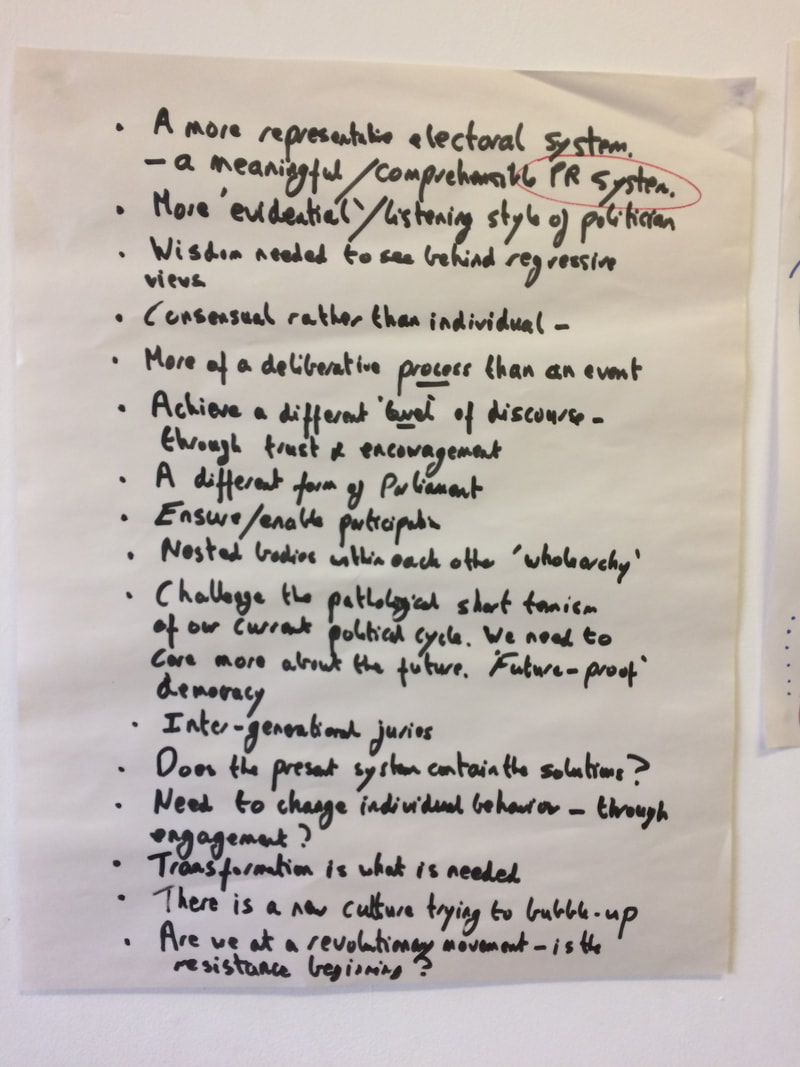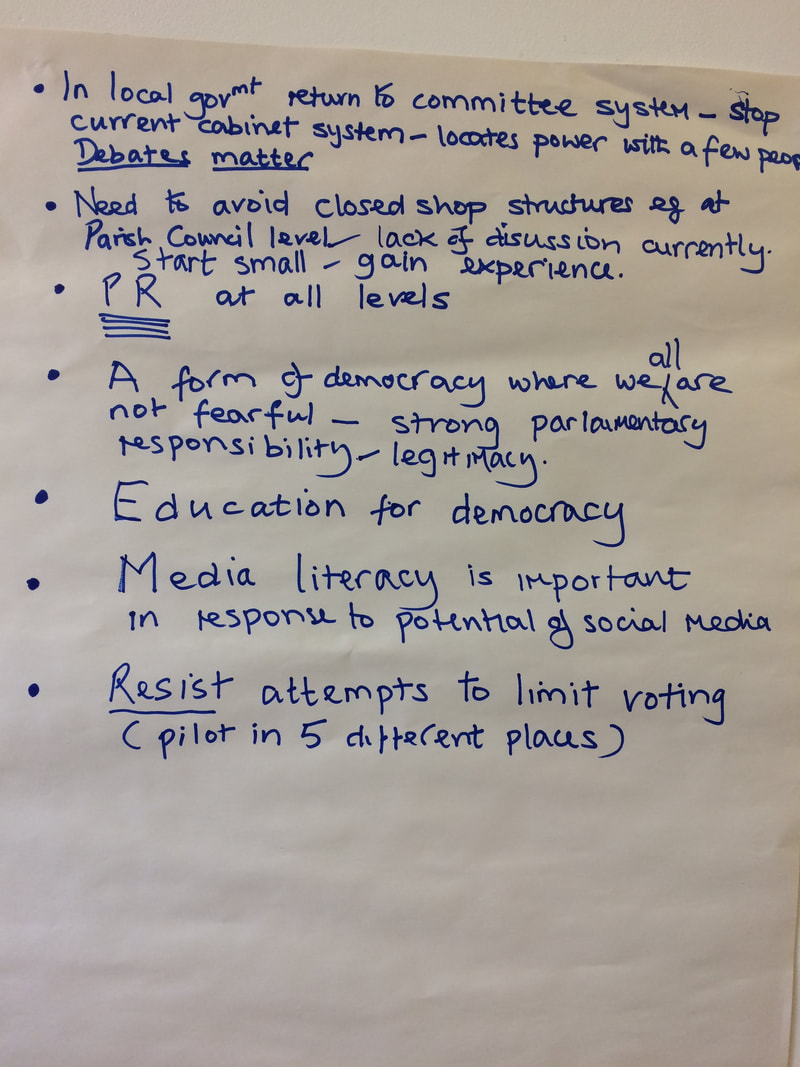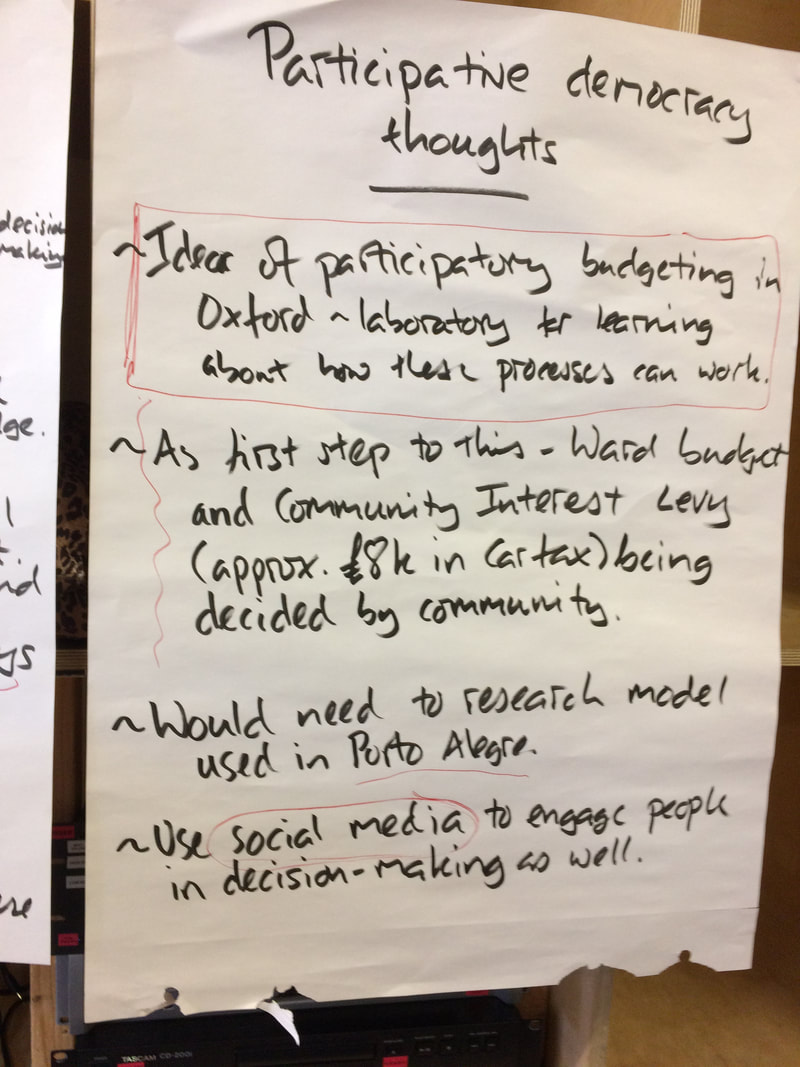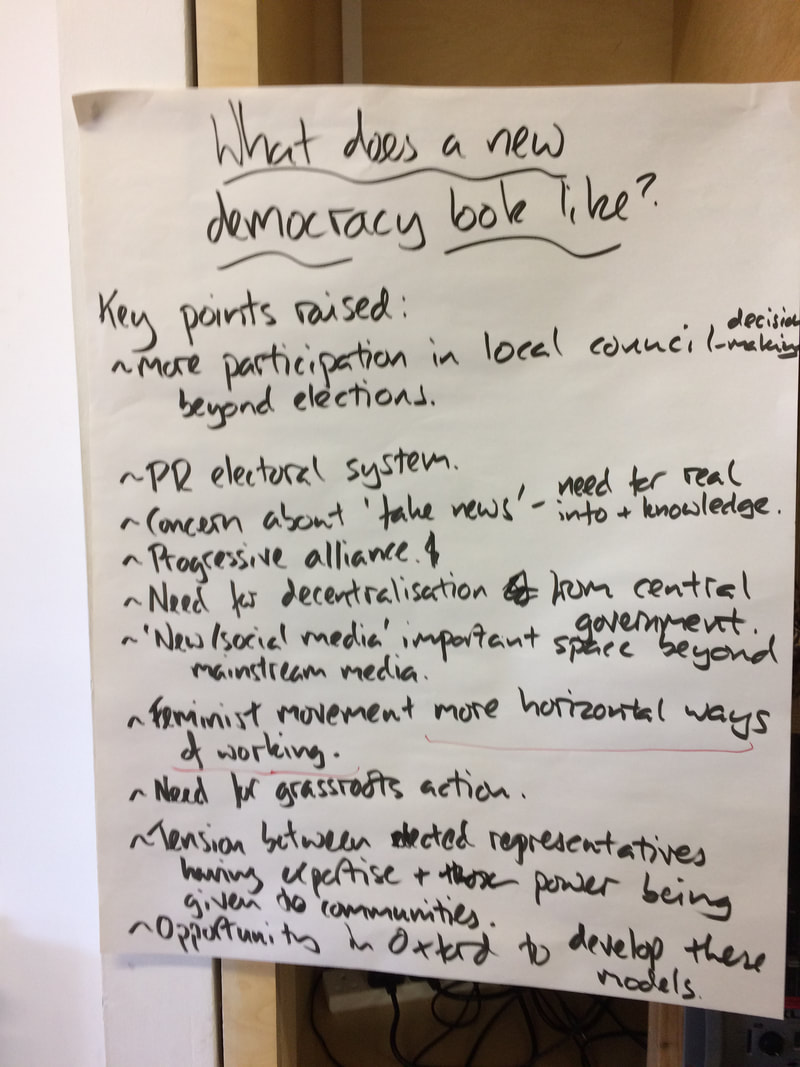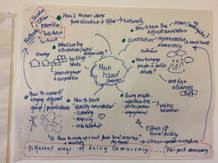Inaugural meeting of the Oxford Democracy Cafe
7th July 2018
7th July 2018
Should there be more to the UK’s democratic process?
This was the question posed at the first Oxford Democracy Café on Saturday 7 July, 2018. More than 25 people came to the Old Fire Station in George Street to discuss their thoughts about a ‘new’ democracy and to learn more about some of the ideas that are already out there.
In the first part of the session participants split into groups to discuss what democracy meant to them and how to do it differently. The conversations in the four groups produced a wide range of thoughts covering issues such as what is wrong with present democracy, how to develop listening conversations on difficult topics and exemplars of participative democracy, including moves to try to use it more locally (see Meeting Reports for more detail).
The following plenary gave space for some of these ideas to be shared with the whole group, with many people taking note of new websites or ideas to research.
The final session focussed on how the Democracy Café should develop. Whilst all agreed that they wanted it to continue there was a range of ideas as to how structured or research based it should be, how much it should be a space for discussion or a base for effecting change, or both. As one participant put it “Many of us belong to other organisations in which we try to influence political policies, locally and nationally, the democracy café is a space to review the vital underlining principles and processes that can effectively promote the changes needed to create better lives for all”.
For those of us organising the café our original vision was that the Democracy Café would become a regular place / space for people to come together to discuss issues and ideas about democracy, and how to use them locally and nationally to work towards a better society. We see it as a hub for local groups and individuals who are trying to effect democratic change. Our Café is also linked to Compass, the non-party political pressure/action group which has members in Oxfordshire. Website address.
This was the question posed at the first Oxford Democracy Café on Saturday 7 July, 2018. More than 25 people came to the Old Fire Station in George Street to discuss their thoughts about a ‘new’ democracy and to learn more about some of the ideas that are already out there.
In the first part of the session participants split into groups to discuss what democracy meant to them and how to do it differently. The conversations in the four groups produced a wide range of thoughts covering issues such as what is wrong with present democracy, how to develop listening conversations on difficult topics and exemplars of participative democracy, including moves to try to use it more locally (see Meeting Reports for more detail).
The following plenary gave space for some of these ideas to be shared with the whole group, with many people taking note of new websites or ideas to research.
The final session focussed on how the Democracy Café should develop. Whilst all agreed that they wanted it to continue there was a range of ideas as to how structured or research based it should be, how much it should be a space for discussion or a base for effecting change, or both. As one participant put it “Many of us belong to other organisations in which we try to influence political policies, locally and nationally, the democracy café is a space to review the vital underlining principles and processes that can effectively promote the changes needed to create better lives for all”.
For those of us organising the café our original vision was that the Democracy Café would become a regular place / space for people to come together to discuss issues and ideas about democracy, and how to use them locally and nationally to work towards a better society. We see it as a hub for local groups and individuals who are trying to effect democratic change. Our Café is also linked to Compass, the non-party political pressure/action group which has members in Oxfordshire. Website address.
Notes from group discussions
WHAT WOULD A NEW/DIFFERENT FORM/S OF DEMOCRACY LOOK LIKE?
This was the key question addressed by the four groups. The flip chart pictures show some of the creativity and commitment involved. Strong and repeated overlapping themes emerged from the groups, with a focus on transformation, a new culture trying to bubble-up – are we at a revolutionary moment?
THEMES
CHANGING OUR ELECTORAL SYSTEM and ITS DELIVERY
We need a different form of Parliament, delivered by a meaningful and comprehensive system of Proportional Representation, at all levels of government. We want a form of democracy ‘which doesn’t frighten us’.
Different and new political processes are needed to deliver real democracy. Progressive alliances, such as helped unseat the Tory MP in Oxford West & Abingdon in 2017. Democracy needs to be ‘future’ proofed against the pathological short termism of our current political cycle.
LOCALISM
Local government should return to the committee system from the current cabinet system which locates power with a few people. Similarly, at Parish Council level closed shop structures which lead to a lack of discussion should be avoided. More devolution from central government.
DEMOCRATIC FORMS and METHODS
Alternative ways of organising, building through pressure groups, making alliances. More horizontal forms of democratic decision making, as exemplified in the Women’s Movement. More participative democracy, especially at local level, and extending beyond elections. Examples discussed focused on spending money and setting budgets via forms of Participative Budgeting, as in the Brazilian city of Port Alegre[1], and in Oxford, how city councillors could take this to ward level. Citizens assemblies such as Citizens UK[2], Sortition[3] and Flatpack Democracy[4], Talk Action[5].
WAYS OF DOING PARTICIPATIVE DEMOCRACY
Engaging people in public debate. Engaging different groups and cultures. How to have quality conversations – listening, enquiry. And how to have difficult conversations on issues such as immigration. Education for democracy, political education.
THE MEDIA
Concern about ‘fake news’ and how to counterbalance it. Media literacy needed. Also, social media to engage, especially young people, and exchange ideas and experiences,
[1] Nearer to home, small funding Participative Budgeting happens in for example Bradford and Newcastle with the Scottish parliament pledging “We support PB as a tool for community engagement and for developing participatory democracy in Scotland". https://www.local.gov.uk/topics/devolution/engaging-citizens-devolution/approaches-civic-and-democratic-engagement-0
[2] www.citizensuk.org/ Citizens UK organises communities to act together for power, social justice and the common good.
[3] the use of random selection to populate assemblies or fill political positions. https://www.sortitionfoundation.org/what_is_sortition
[4] As in Frome, Somerset where Independents for Frome (IfF) was created to support a group of individuals to stand and get elected to Frome Town Council in 2011. https://www.flatpackdemocracy.co.uk/about/
[5] http://www.talkaction.org/about/ Talk Action is a community development organisation that brings radical ideas to life!
WHAT WOULD A NEW/DIFFERENT FORM/S OF DEMOCRACY LOOK LIKE?
This was the key question addressed by the four groups. The flip chart pictures show some of the creativity and commitment involved. Strong and repeated overlapping themes emerged from the groups, with a focus on transformation, a new culture trying to bubble-up – are we at a revolutionary moment?
THEMES
CHANGING OUR ELECTORAL SYSTEM and ITS DELIVERY
We need a different form of Parliament, delivered by a meaningful and comprehensive system of Proportional Representation, at all levels of government. We want a form of democracy ‘which doesn’t frighten us’.
Different and new political processes are needed to deliver real democracy. Progressive alliances, such as helped unseat the Tory MP in Oxford West & Abingdon in 2017. Democracy needs to be ‘future’ proofed against the pathological short termism of our current political cycle.
LOCALISM
Local government should return to the committee system from the current cabinet system which locates power with a few people. Similarly, at Parish Council level closed shop structures which lead to a lack of discussion should be avoided. More devolution from central government.
DEMOCRATIC FORMS and METHODS
Alternative ways of organising, building through pressure groups, making alliances. More horizontal forms of democratic decision making, as exemplified in the Women’s Movement. More participative democracy, especially at local level, and extending beyond elections. Examples discussed focused on spending money and setting budgets via forms of Participative Budgeting, as in the Brazilian city of Port Alegre[1], and in Oxford, how city councillors could take this to ward level. Citizens assemblies such as Citizens UK[2], Sortition[3] and Flatpack Democracy[4], Talk Action[5].
WAYS OF DOING PARTICIPATIVE DEMOCRACY
Engaging people in public debate. Engaging different groups and cultures. How to have quality conversations – listening, enquiry. And how to have difficult conversations on issues such as immigration. Education for democracy, political education.
THE MEDIA
Concern about ‘fake news’ and how to counterbalance it. Media literacy needed. Also, social media to engage, especially young people, and exchange ideas and experiences,
[1] Nearer to home, small funding Participative Budgeting happens in for example Bradford and Newcastle with the Scottish parliament pledging “We support PB as a tool for community engagement and for developing participatory democracy in Scotland". https://www.local.gov.uk/topics/devolution/engaging-citizens-devolution/approaches-civic-and-democratic-engagement-0
[2] www.citizensuk.org/ Citizens UK organises communities to act together for power, social justice and the common good.
[3] the use of random selection to populate assemblies or fill political positions. https://www.sortitionfoundation.org/what_is_sortition
[4] As in Frome, Somerset where Independents for Frome (IfF) was created to support a group of individuals to stand and get elected to Frome Town Council in 2011. https://www.flatpackdemocracy.co.uk/about/
[5] http://www.talkaction.org/about/ Talk Action is a community development organisation that brings radical ideas to life!

